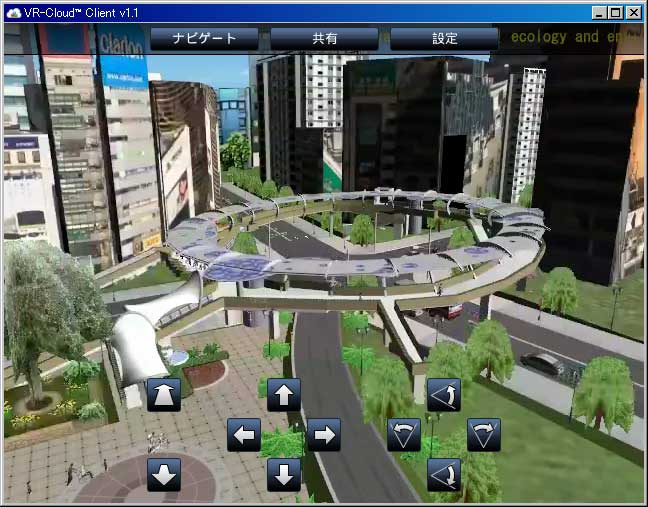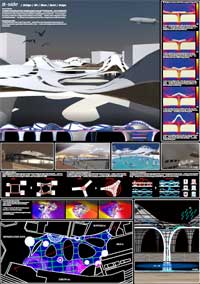Awarded works and judgment result (Posted on '11.11.04)
 |
1st Student BIM&VR Design Contest on cloud
-Competition of the advanced architectural civil design using BIM&VR on cloud ! -
Theme 2011 "SHIBUYA Bridge" Pedestrian bridge design -New equipment in urban space -
| Awarded works and judgment result | |
| Date | : | Friday, November 4, 2011 |
| Attendee | : | yJudgesz Mr. Yasushi Ikeda(Chairman of the awards committee, professor of Keio University/ Representative of IKDS) Mr. Yoshihisa Hanamura(NPO civil machizukudi station) Kostas Terzidis(Associate professor of Harvard University) Mr. Tomohiro Fukuda(Associate professor of Osaka university) Mr. Ryuta Ieiri(Representative of Ieiri LAB) yWorkshop instructorz Mr. Hiroo Kasagi(Representative of NPO Chiikizukuri Kobo) |
The entry teams of "the Virtual Design World Cup -1st Student BIM & VR Design Contest on cloud"were total 58 teams, the the final works were submitted from 15 teams from 13 countries. On November 4, 2011, the board of review was held in the seminar room, Tokyo head office, FORUM8, and the World Cup Award (Grand Prix) and the five special judgment awards were selected from fifteen works.
| Grand Prix World Cup Award | |
| Title | : | The Oasis | ||
|
|
||||
| Team name | : | Urban city Lab, Kanazawa University(Urban planning and architecture planning lab of Kanazawa University, Japan) | ||
|
|
||||||||||||||||||
|
||||||||||||||||||
| Review of VDWC | |
This is the first international competition sponsored by forum 8 related to new visualization technologies. In particular, the use the BIM and VR were of high interest in this new competition. The jury appreciated all projects as they all exhibited so many diverse and fresh ideas coming from all over the world. We appreciate your interest in this competition.
Given the diverse uses of the tools as well as the multitude of design approaches, the jury had a heated discussion in its effort to choose a winning entry. One of the points discussed in the jury process was the difference in impression of a project when viewed as a 2D versus as in VR. This had a special weight in the understanding and appreciation of the projects. So, for the future it is good to not only show the VR but also the real world situation in which the project applies to. All of the awards are of high level and we can say that they all have the possibility of getting the grand prix especially entry number 40 OASIS and entry number 04 AMOEBA. Both remained final competitors in the debate and that directed the discussion of the jury towards the potential implementation of VR in architecture.
As a result, today, number 40 OASIS got the Grand Prix award because they had a diverse point of view, used a range of tools, and developed a realistic idea. On the other hand they had some criticism concerning their architectural solution. It did not display any uniqueness or formal qualities that would justify its architectural dimension. Rather the formal solution was rather conservative and ordinary. Compared to the movable structure of the entry 04, the jury felt that while AMOEBA used less tools and exhibited structural and pedestrian problems, it did have a seminal idea as it exhibited the notion of time throughout an architectural structure. The jury felt that motion and kinetics are of paramount importance for the future of architecture and could address issues of flexibility, adjustability, and plasticity.
In addition, four more projects did catch the attention of the jury. Shibuya Sky Way received the Civil Design Award for its innovative idea of connecting two antithetical sides of Shibuya. By connecting the two sides they were able to unify Shibuya as a neighborhood as opposed to a railway station. B-Site project was awarded the Enorasis award because of its formal qualities related to the use of wind as a feedback guide. Tokyo 2020 received an Environmental Design and Information Technology award for exhibiting the city of Tokyo in its Olympic competition. Also, its use of lighting colors was of great importance as it addressed the issues of nightscape. Finally, Hatching the Future received the Best Rendez-vou Place Award for its organic form and comfort for the pedestrians.
On behalf of the Jury for the Virtual Design World Cup we would like to congratulate all entries for their wonderful, seminal, and important work.
|
| Judgment scenes | |
 |
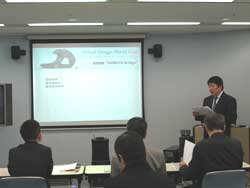 |
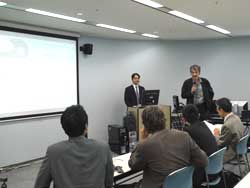 |
| Poster session | Opening greeting from Mr. Ito, president of FORUM8 | Speech from Mr. Yasushi Ikeda, the chairman of the awards committee |
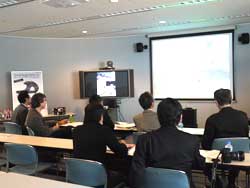 |
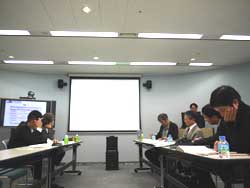 |
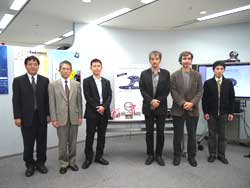 |
| Discussion while viewing the script and VR data of each work | Exchange of opinions for selecting the Grand-Prix | Mr. Ryuta Ieiri, Mr. Yoshihisa Hanamura, Mr. Tomohiro Fukuda, Mr. Yasushi Ikeda, Mr. Kostas Terzidis, Mr. Hiroo Kasagi from left. |
| Special Judgment Award | |

